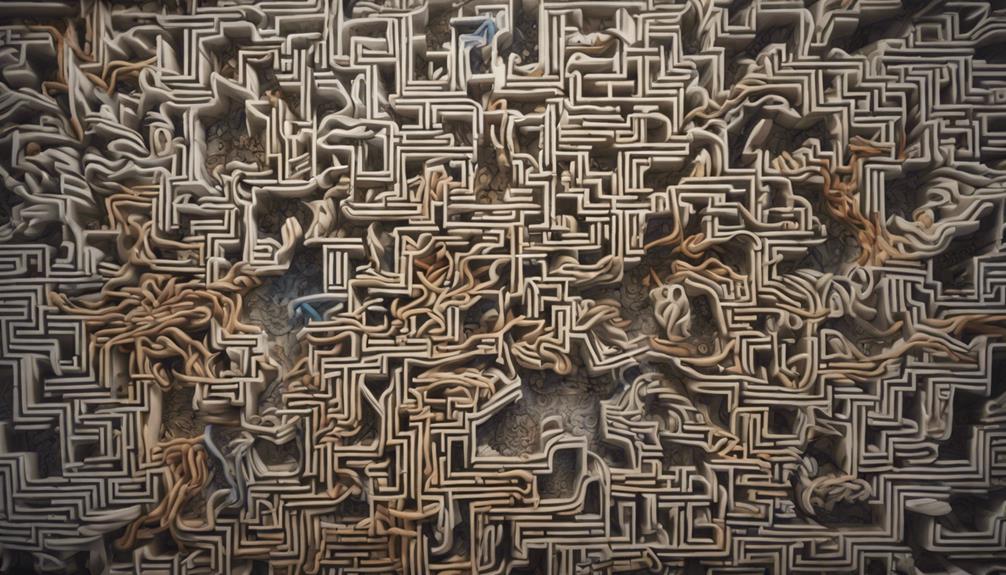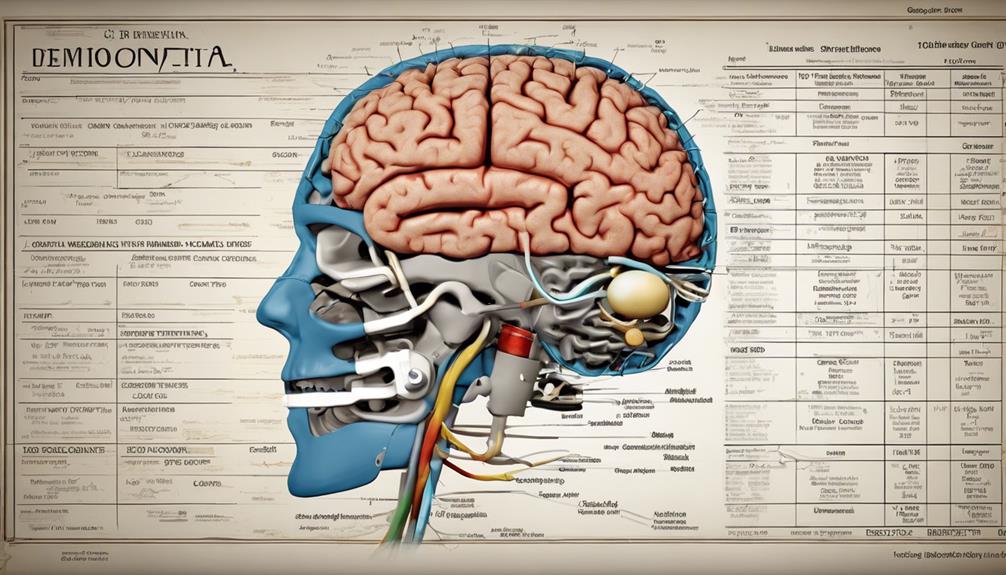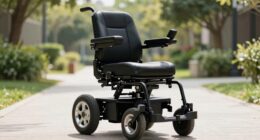Exploring the complex relationship between dementia and schizophrenia is like untangling a detailed tapestry of interconnected threads. The dynamic interaction between these two disorders offers an intriguing research area, revealing common traits and possible outcomes.
As we navigate through the maze of symptoms and risk factors, uncovering the nuances of how these disorders intersect could offer profound insights into the realm of mental health.
Key Takeaways
- Shared characteristics and brain changes in dementia and schizophrenia.
- Cognitive deficits and memory impairments common in both disorders.
- Atypical antipsychotics show promise in managing dementia in schizophrenia.
- Caregivers need specialized care plans and access to support services.
Understanding Dementia and Schizophrenia
Understanding the complex interplay between dementia and schizophrenia requires a deep dive into the overlapping neurological manifestations and treatment implications of these two disorders. In cases where dementia occurs in schizophrenia, there's a glimmer of hope as some instances may be reversible with appropriate interventions. Neuroimaging studies have unveiled specific changes in the brains of individuals with schizophrenia and dementia, such as ventricular enlargement and cortical atrophy, shedding light on the underlying mechanisms at play. The use of atypical antipsychotics has shown promise in managing dementia within the context of schizophrenia, offering a potential avenue for improved outcomes.
Furthermore, cognitive deficits, including attention and memory impairments, have been observed in chronic schizophrenic patients, underscoring the intricate relationship between cognitive function and these disorders. Notably, late-onset schizophrenia has been linked to an increased risk of dementia, with very late-onset schizophrenia carrying a threefold risk, emphasizing the need for targeted screening and management strategies in this population. By delving into these nuances, we can better navigate the complexities of addressing dementia within the realm of schizophrenia.
Overlapping Symptoms and Challenges

The overlapping symptoms and challenges presented by dementia and schizophrenia require a nuanced approach to accurately differentiate between these complex conditions. Both disorders can exhibit symptoms such as cognitive impairment, behavioral changes, and psychotic features, making diagnosis and management intricate. Cognitive decline and memory problems are common in both dementia and schizophrenia, posing a significant challenge in distinguishing between the two.
Utilizing cognitive testing, memory assessments, and brain scans becomes crucial in accurately diagnosing these mental health conditions. Individuals with schizophrenia also face an increased risk of developing dementia, underscoring the intricate relationship between these disorders. The shared symptoms of delusions and hallucinations further highlight the complexity in differentiating between the two conditions.
Understanding the subtleties in symptom presentation and utilizing comprehensive diagnostic tools are essential in providing effective care and support for individuals affected by dementia and schizophrenia.
Diagnosis and Treatment Considerations
What diagnostic criteria differentiate between schizophrenia and dementia, and how do treatment approaches vary for these complex mental health conditions?
When diagnosing schizophrenia, clinicians focus on symptoms like delusions and hallucinations, while dementia diagnosis involves cognitive testing, memory assessments, and brain scans. Treatment for schizophrenia typically includes antipsychotic medications to alleviate symptoms, cognitive therapy to improve coping skills, and family support for holistic care. In contrast, managing dementia often involves medication to address cognitive decline, therapy to enhance quality of life, social support for emotional well-being, and lifestyle interventions to promote overall health.
Neuropsychological evaluations in schizophrenia help identify cognitive impairments, with neuroimaging studies revealing ventricular enlargement and cortical atrophy in individuals with both schizophrenia and dementia. Promisingly, atypical antipsychotics show potential in treating dementia within the context of schizophrenia, highlighting the role of pharmacological interventions in potentially reversing dementia symptoms and enhancing cognitive function. Cognitive impairments in schizophrenia, such as attention deficits and memory issues, may be linked to neuropathological changes that increase dementia risk, underscoring the importance of tailored treatment plans and effective management strategies.
Impact on Individuals and Caregivers

Caregivers of individuals coping with both dementia and schizophrenia frequently encounter heightened challenges in managing the complex interplay of symptoms and providing necessary support. The unique combination of symptoms from both conditions can significantly impact the individual's daily functioning, leading to increased caregiving demands. Providing effective care for these individuals requires specialized care plans tailored to address the specific needs arising from dementia and schizophrenia. Due to the overlap of symptoms, diagnosis and treatment can be particularly challenging for healthcare professionals, necessitating a multidisciplinary approach.
Caregivers play a crucial role in ensuring the well-being of individuals with dementia and schizophrenia. Education and training are essential for caregivers to understand the complexities of these conditions and to develop the skills needed to provide optimal care and support. Access to support services and resources is vital for caregivers to navigate the challenges associated with managing the care of individuals with dementia and schizophrenia effectively. By recognizing the impact of these conditions on both individuals and caregivers, we can strive to enhance the quality of care and support available for those affected.
Research and Future Directions
Considering the significant association between psychotic disorders such as schizophrenia and the heightened risk of developing dementia, exploring the underlying mechanisms and potential interventions becomes imperative for advancing our understanding and enhancing future care strategies.
Research has shown that individuals with psychotic disorders have an increased susceptibility to dementia, as evidenced by a systematic review involving nearly 13 million participants. Notably, late-onset schizophrenia patients are three times more likely to develop neurocognitive disorder, emphasizing the need for further investigation into this relationship.
Effective mental health management across the lifespan may play a crucial role in reducing the risk of dementia in individuals with psychotic disorders. Future research directions should focus on unraveling the underlying mechanisms linking psychotic disorders to dementia risk and developing targeted interventions to mitigate this impact.
Frequently Asked Questions
Is Schizophrenia Linked With Dementia?
Yes, schizophrenia is linked with dementia. Research shows a significant association between schizophrenia and an increased risk of developing dementia.
This risk is especially elevated in men and individuals with late-onset schizophrenia. Long-term use of antipsychotic medications and underlying brain changes in schizophrenia can contribute to cognitive decline, further increasing the likelihood of dementia.
Understanding this link is crucial for effective intervention and care strategies.
What Type of Dementia Mimics Schizophrenia?
Sure thing!
Frontotemporal dementia can often resemble schizophrenia due to shared symptoms like behavioral changes and social withdrawal.
It's essential to conduct thorough evaluations to distinguish between the two conditions accurately. Misdiagnoses can occur due to overlapping psychotic symptoms such as hallucinations and delusions.
Differentiating between frontotemporal dementia and schizophrenia is critical for tailoring effective treatment plans and managing these distinct conditions appropriately.
How Your Body Warns That Dementia Is Forming?
As our bodies start to develop dementia, warning signs may manifest in various ways. Changes in memory, cognition, and behavior can serve as early indicators. Difficulty with familiar tasks, communication, and decision-making may signal the onset of this condition.
Social withdrawal, mood swings, and confusion could also be early signs. It's crucial to pay attention to these subtle cues as they may offer valuable insights into the formation of dementia.
What Is the Number One Trigger for Dementia Behavior?
Understanding the triggers for dementia behavior is crucial in providing effective care. Agitation, often stemming from discomfort, frustration, or confusion, is the primary trigger.
By recognizing and addressing these underlying causes, we can better manage challenging situations and improve the quality of life for individuals with dementia.
Creating a calming environment, promoting effective communication, and meeting their needs can significantly reduce agitation and enhance their well-being.
Conclusion
In navigating the complex landscape of dementia and schizophrenia, we must tread carefully, like skilled explorers charting unknown territories. By understanding the overlapping symptoms and challenges, diagnosing and treating with precision, and supporting individuals and caregivers with empathy and knowledge, we can shine a light on the path forward.
Research and ongoing efforts will continue to guide us through this intricate terrain, illuminating new possibilities for improved care and outcomes.









